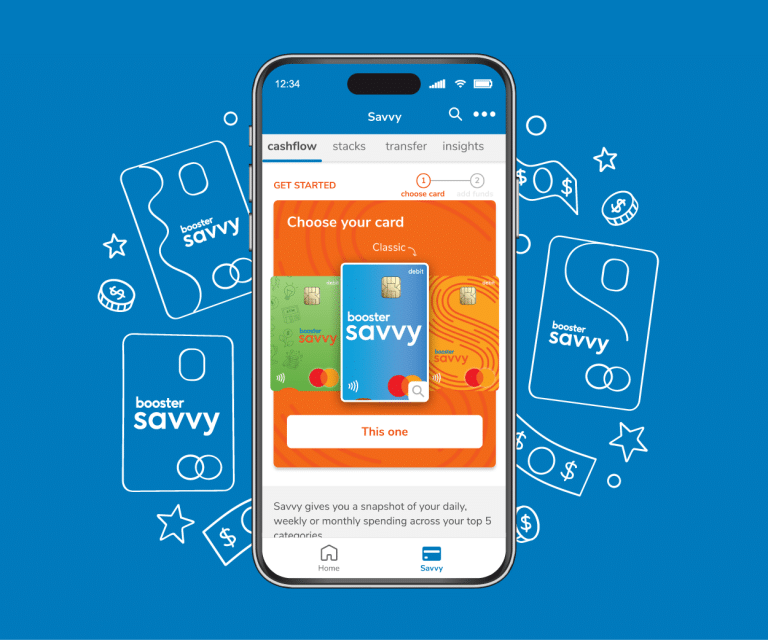Teaching your kids about money provides them with a toolbox that will be incredibly useful through life in making confident and informed decisions. The key is making what you teach them age appropriate.
Young children (Ages 5-12)
Money is not unlimited – The ease of debit and credit cards often give the perception that they are free-money dispensers. Helping kids realise money is a finite resource earned through hard work, and banks are just a place to keep it safe, is a good starting point. How? Perhaps offer rewards, like pocket money in exchange for doing small household chores.
Getting into the saving habit – Pocket money is a good way to give kids a financial head start. Kids as young as five can be taught how to manage their petty cash. But keep in mind that the path to ‘money wisdom’ is paved with mistakes. If you allow your kids to make them, they will learn first-hand the consequences of overspending, and the importance of working within their budget.
Waiting pays off – At all life’s stages, it can be easy to get caught up in the ‘buy now, pay later’ mentality, which can translate into mounting debts. Reinforce the concept that waiting pays off by giving your children everyday examples. Practicing ‘delayed gratification’ is a valuable skill, which can positively affect every aspect of life.
Avoid negative associations with money – As much as you can, try not to pass along a negative money mindset to kids. Use the financial challenges you may have gone through as useful lessons, and help your children see money as an opportunity, rather than a risk.
Lead by example – As we all know, kids are blank canvases, eager to absorb knowledge and understand how things work. As adults, we’re responsible for planting good seeds and leading by example. If you’re teaching your children about the importance of waiting, for example, try to avoid impulse buys.
Teenagers (Ages 13-17)
Do you have a teenager in the family? Now could be a good opportunity to set them on the path to financial wellbeing – before they leave home.
Encourage them to join KiwiSaver – By starting KiwiSaver early, they will really benefit from compound returns. 16-17 year olds are eligible for the government contributions too, which is great for building their retirement fund and potentially a deposit for their first home
Get in touch with the team at Cole Murray Financial Advisers. We can help you and your children find the right KiwiSaver provider and fund.
Encourage a saving mentality – Fostering healthy approaches to both saving and debt. Discuss credit and how to avoid falling into the ‘debt trap.’ Cover budgeting basics and saving for consumer goods – essential lessons that help develop financial savvy as they mature.
Share your financial story – What financial decisions would you have made differently, if you knew then what you know now? By giving your children real-life examples, you can help them understand the different consequences of their money behaviours. Talking openly about money shows that it’s not a taboo subject and that it’s OK to make mistakes and ask for help – enabling healthy money choices.
Financial awareness – Financial decisions are a crucial part of everyday life. So showing your children that their choices can have financial implications will empower them to understand the value of financial security, savings, and choices.
A good example of this is the conundrum between going away to University and staying local. Help them weigh up and work through the financial implications of either option, and whether to take on a student loan or work to finance it themselves. Perhaps, with a little help from you?
Set clear support boundaries – Be transparent about how much financial support you’re prepared to provide – including education, their first car, or buying their first home. Clear guidelines help set realistic expectations while encouraging independence. You will always be there for them, but it’s important that they learn how to fly on their own.
Young adults (Ages 18-25)
This is a pivotal time where your young adult will transition from dependence to independence. In saying that, they may still want your support in helping them learn the money habits and knowledge to help build good financial wellbeing for their future.
Encourage them to build an emergency fund – Before diving into major purchases, prioritising building an emergency fund covering 3-6 months of living expenses is a good idea. This financial safety net helps protect them against unexpected job loss, medical expenses, or major repairs, preventing the need to rely on high-interest debt during tough times.
Help them understand the true cost of homeownership – While buying their first home is exciting, it’s important to understand all associated costs beyond the deposit. Legal fees, building inspections, rates, insurance, maintenance, and ongoing mortgage payments just to name a few. Encourage your child to come and talk to a Mortgage Adviser to get advice on their situation.
Start building their house deposit – Take advantage of KiwiSaver. They can come and speak with a KiwiSaver Adviser to help them make sur they are in the right fund with the right provider for them. Also, looking at how much their lifestyle costs and working out how much they can save each week to get enough for a deposit.
Don’t overlook insurance protection – As your child accumulates assets and takes on responsibilities, insurance becomes more important. They might want to consider contents insurance for their belongings or health insurance for medical costs. Cole Murray has Insurance Advisers that can help them decide what suits them best.
Establish good credit habits – Our credit histories impacts everything! From rental applications to mortgage rates. Teach your children about the importance of paying bills on time, keeping credit card balances low, and avoiding applying for multiple forms of credit simultaneously. A good credit score now will save them thousands in interest over their lifetime.
Invest in their earning potential – Whether through further education, professional development, or skill building, investing in themselves often provides the best returns.
Your children’s financial journey starts here
Want to lead your kids on the right financial path? The sooner they learn how to handle money responsibly, the more likely they are to develop good money habits later on in life. Encouraging saving and smart spending habits is an important step towards building a money-savvy future. You can start with making saving fun, and introduce more sophisticated saving strategies as your children grow.
As a parent, you’re not alone in this education journey. Cole Murray Financial Advisers, have a fantastic team in place to help your kids achieve financial independence. If you have any questions about anything discussed in this article, please don’t hesitate to contact our team today.
Please also share this article with your kids if you think it might be useful.
An Adviser Disclosure Statement is available free and upon request




